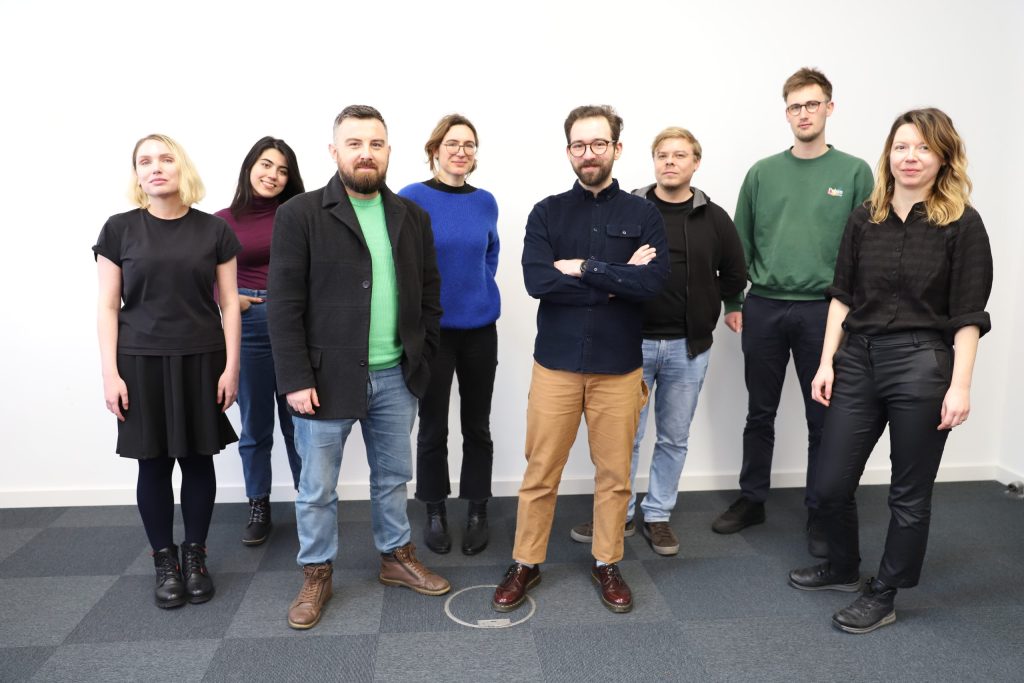Junior Research Group (JRG)
Coordinator: Dr. Katarina Damčević, IOS

Picture taken at Methods Workshop on Data Management at ZOiS, 2.-3.2.2023. From left to right: Alyona Bidendo, Nafisa Mirzojamshedzoda, Ivaylo Dinev, Lena Pieber, Nikola Gajić, Géza Tasner, Philipp Zimmermann (student assistant at ZOiS), Mela Žuljević (c) Alex Nowicky/ ZOiS
Description
The JRG includes the five PhD-students Alyona Bidenko, MA (ZZF), Lena Pieber, MA (ZOiS), Nafisa Mirzojamshedzoda, MA (HNEE), Nikola Gajić, MA (IOS), and Géza Tasner, MA (FSU) and the three Post-Doctoral Researchers Dr. Mela Žuljević (VisLab, IfL), Dr. Ivaylo Dinev (DataLab, ZOiS) and Dr. Katarina Damčević (coordinator of JRG, IOS)
In addition to connecting these researchers within the KonKoop network, the JRG functions as a network in itself and serves as a community and platform that reinforces collaboration and provides support for its members in the course of their PhD studies. This is done through activities such as regular JRG meetings that support the members´ research and associated activities through workshops, guest lectures, and discussions. JRG members are also supported in organizing and implementing activities related to their research, such as panels and workshops.
Activities and initiatives
The JRG members have taken part in different activities that support their research process and the development of a wider academic skillset. Some of those activities include data management planning, methods workshops, reading groups, insights into archival research, and publishing strategies, among others. Since the beginning of the project they have participated and contributed to methods workshops in ZOiS and IOS, as well as presented their work in various conferences. Ekaterina Mikhailova coordinated the group until 2023.
Future activities that the JRG will have the opportunity to participate in and contribute to include the exploration of different theories and methods in conflict analysis, communicating science, as well as researchers´ well-being and ethical engagement in conflict research. Coordinated and facilitated by Katarina Damčević, these activities will serve to promote knowledge transfer and interdisciplinarity through different institutional collaborations and exchanges. Accordingly, the JRG members will gain insight into the ways how semiotic theories and methods contribute to conflict studies. Further, they will have the opportunity to present their work at different scholarly exchanges, with the overarching goal of enhancing cooperation among early career researchers. Multiple workshops will be dedicated to supporting the writing process of the JRG while focusing on communicating research through different genres, as well as on hands-on activities such as writing groups and peer-feedback, genre analysis, and writing and emotional well-being. Guest lectures and seminars on different approaches and case studies, specifically tailored to the needs of the JRG, will be organized on a regular basis.
Members and topics
PhD-Students:
Alyona Bidenko researches the ongoing Russian invasion of Ukraine by examining individual violent actors during their deployment and the environments that produced them. Read more about Alyona´s topic here.
Lena Pieber researches economic agency in the context of unrecognized statehood. You can read more about Lena´s topic here.
Nafisa Mirzojamshedzoda´s research focuses on environmental change and natural resources management in the Ferghana Valley. Read more about Nafisa´s topic here.
Nikola Gajić explores the roles that victim witnesses’ court testimonies in the ICTY trials have in the creation of multiple memories of the 1990s wars in the countries of former Yugoslavia. Read more about Nikola´s topic here.
Géza Tasner researches patronage and strategic competition in secessionist conflicts. Read more about Géza´s topic here.
Post-Doc-Researchers:
Ivaylo Dinev focuses on mass protest mobilisations in Eastern Europe, Southeast Europe, Central Asia and the Caucasus in the last four decades. Read more about Ivo’s topic here and find the DataLab here.
Katarina Damčević explores the dynamics and use of controversial symbols during and after large scale conflicts by focusing on the slogans “Ready for the Homeland!” and “Glory to Ukraine!” and she coordinates the JRG. Read more about Katarina’s topic here.
Mela Žuljević researches the ‘peace cartography’, that was imposed on Bosnia and Herzegovina in 1995 by international diplomacy, and she coordinates the VisLab. Read more about Mela’s topic here and find the VisLab here.
